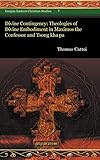Divine Contingency: Theologies of Divine Embodiment in Maximos the Confessor and Tsong kha pa / Thomas Cattoi.
Material type: TextSeries: Gorgias Eastern Christian StudiesPublisher: Piscataway, NJ : Gorgias Press, [2008]Copyright date: ©2008Description: 1 online resource (321 p.)Content type:
TextSeries: Gorgias Eastern Christian StudiesPublisher: Piscataway, NJ : Gorgias Press, [2008]Copyright date: ©2008Description: 1 online resource (321 p.)Content type: - 9781593339708
- 9781463215439
- online - DeGruyter
| Item type | Current library | Call number | URL | Status | Notes | Barcode | |
|---|---|---|---|---|---|---|---|
 eBook
eBook
|
Biblioteca "Angelicum" Pont. Univ. S.Tommaso d'Aquino Nuvola online | online - DeGruyter (Browse shelf(Opens below)) | Online access | Not for loan (Accesso limitato) | Accesso per gli utenti autorizzati / Access for authorized users | (dgr)9781463215439 |
Frontmatter -- Table of Contents -- Preface: The Challenge of Contingency -- 1. Dialogue or Enstasy? Spiritual Transformation Across Different Traditions -- 2. And His Kingdom will have an End: Evagrios Pontikos and the Flight from Plurality -- 3. The Redemption of Plurality: Maximos the Confessor and the Christo-centric Cosmos -- 4. Moira Theou: Spiritual Transformation and the Boundaries of Identity -- 5. The Henad in Tibet: rDzogs chen and Original Self-Awareness -- 6. The Gift of dharmakāya: Contemplation and Philosophy in Tsong kha pa’s Understanding of Practice -- 7. Imitatio Buddhae and Deification: Perfections and Virtues in Tsong kha pa and Maximos the Confessor -- 8. The Virtues of Participation: Maximos’ Theology of Divine Embodiment after the Encounter with Buddhism -- 9. Conclusion -- Bibliography -- Index
restricted access online access with authorization star
http://purl.org/coar/access_right/c_16ec
This work explores the points of contact, as well as the differences between the distinct notions of divine embodiment developed by Maximos the Confessor (580-662), one of the greatest Greek Fathers, and Tsong kha pa (1357-1419), arguably the most important thinker in the history of Tibetan Buddhism. Both authors developed a spiritual theology where natural contemplation and the practice of the virtues are invested with a transformative value and are construed as a response to a cosmic intelligence, which sustains the universe, but also becomes manifest in history.
Mode of access: Internet via World Wide Web.
In English.
Description based on online resource; title from PDF title page (publisher's Web site, viewed 01. Dez 2022)


